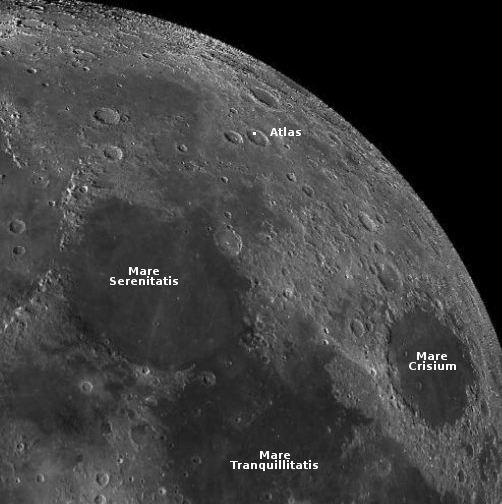Ispace announces new launch date and landing site on Moon for Hakuto-R lander

Ispace today announced that its commercial lunar lander, Hakuto-R, will now launch on a Falcon 9 rocket on November 28, 2022 and will arrive on the Moon in 54-mile-wide Atlas Crater in April 2023.
The white dot on the map to the right shows this landing spot, in the crater’s northern quadrant. Atlas is distinct in that its crater floor has many large fissures with the crater’s interior rim terraced, but this area is relatively smooth.
The spacecraft will carry seven commercial payloads, including the UAE rover Rashid, which is about the size of a small Radio Flyer wagon and will operate on the surface for about two weeks (one lunar day). It has cameras, whose primary research function will be to photograph the variety of different materials attached to the rover’s wheels to see how each interacts with the Moon’s very harsh and abrasive dust.
On Christmas Eve 1968 three Americans became the first humans to visit another world. What they did to celebrate was unexpected and profound, and will be remembered throughout all human history. Genesis: the Story of Apollo 8, Robert Zimmerman's classic history of humanity's first journey to another world, tells that story, and it is now available as both an ebook and an audiobook, both with a foreword by Valerie Anders and a new introduction by Robert Zimmerman.
The print edition can be purchased at Amazon or from any other book seller. If you want an autographed copy the price is $60 for the hardback and $45 for the paperback, plus $8 shipping for each. Go here for purchasing details. The ebook is available everywhere for $5.99 (before discount) at amazon, or direct from my ebook publisher, ebookit. If you buy it from ebookit you don't support the big tech companies and the author gets a bigger cut much sooner.
The audiobook is also available at all these vendors, and is also free with a 30-day trial membership to Audible.
"Not simply about one mission, [Genesis] is also the history of America's quest for the moon... Zimmerman has done a masterful job of tying disparate events together into a solid account of one of America's greatest human triumphs."--San Antonio Express-News

Ispace today announced that its commercial lunar lander, Hakuto-R, will now launch on a Falcon 9 rocket on November 28, 2022 and will arrive on the Moon in 54-mile-wide Atlas Crater in April 2023.
The white dot on the map to the right shows this landing spot, in the crater’s northern quadrant. Atlas is distinct in that its crater floor has many large fissures with the crater’s interior rim terraced, but this area is relatively smooth.
The spacecraft will carry seven commercial payloads, including the UAE rover Rashid, which is about the size of a small Radio Flyer wagon and will operate on the surface for about two weeks (one lunar day). It has cameras, whose primary research function will be to photograph the variety of different materials attached to the rover’s wheels to see how each interacts with the Moon’s very harsh and abrasive dust.
On Christmas Eve 1968 three Americans became the first humans to visit another world. What they did to celebrate was unexpected and profound, and will be remembered throughout all human history. Genesis: the Story of Apollo 8, Robert Zimmerman's classic history of humanity's first journey to another world, tells that story, and it is now available as both an ebook and an audiobook, both with a foreword by Valerie Anders and a new introduction by Robert Zimmerman.
The print edition can be purchased at Amazon or from any other book seller. If you want an autographed copy the price is $60 for the hardback and $45 for the paperback, plus $8 shipping for each. Go here for purchasing details. The ebook is available everywhere for $5.99 (before discount) at amazon, or direct from my ebook publisher, ebookit. If you buy it from ebookit you don't support the big tech companies and the author gets a bigger cut much sooner.
The audiobook is also available at all these vendors, and is also free with a 30-day trial membership to Audible.
"Not simply about one mission, [Genesis] is also the history of America's quest for the moon... Zimmerman has done a masterful job of tying disparate events together into a solid account of one of America's greatest human triumphs."--San Antonio Express-News


Wow, a five month transit to the moon. It’s interesting that they seem to feel that a long duration transfer with multiple small maneuvers is the better choice than just packing in enough dV to capture at the moon from a Hohmann transfer. Falcon 9 might be a bit light for a normal Hohmann transfer on this payload, but Falcon Heavy could do it easily I would think.
David Eastman,
Many factors determine the launch rocket, the payload’s mass, the mission profile, and whether it is manned or robotic. My guess is that the difference in price between the Falcon 9 and the Falcon Heavy had a lot to do with this mission. SpaceX may have had an edge in the choice of rocket because of the ease of availability given by reusable rockets for customers.
Perhaps, for this mission, several tens of millions of dollars can be saved by being more patient on the transit time. CAPSTONE’s transit was similarly long.